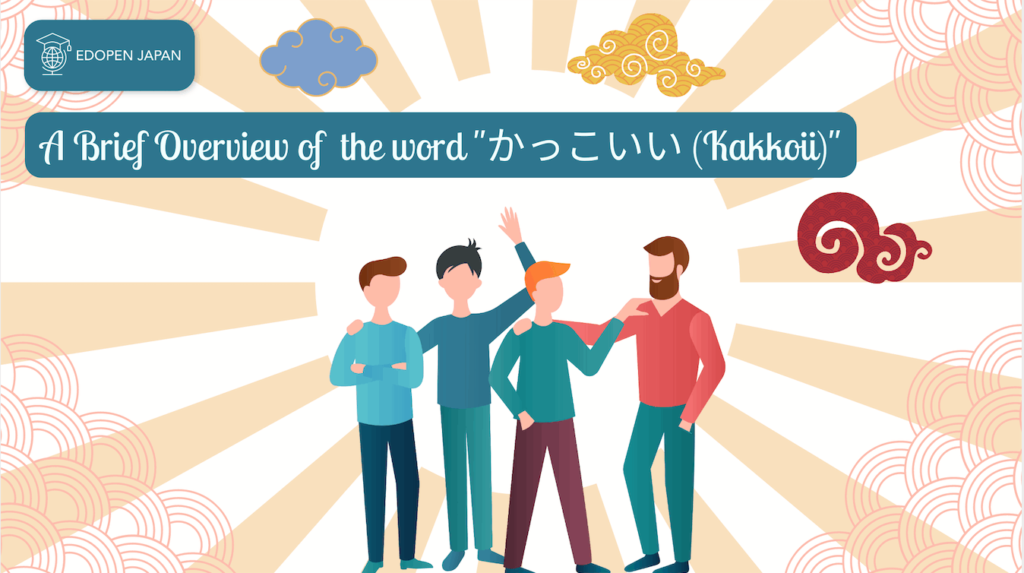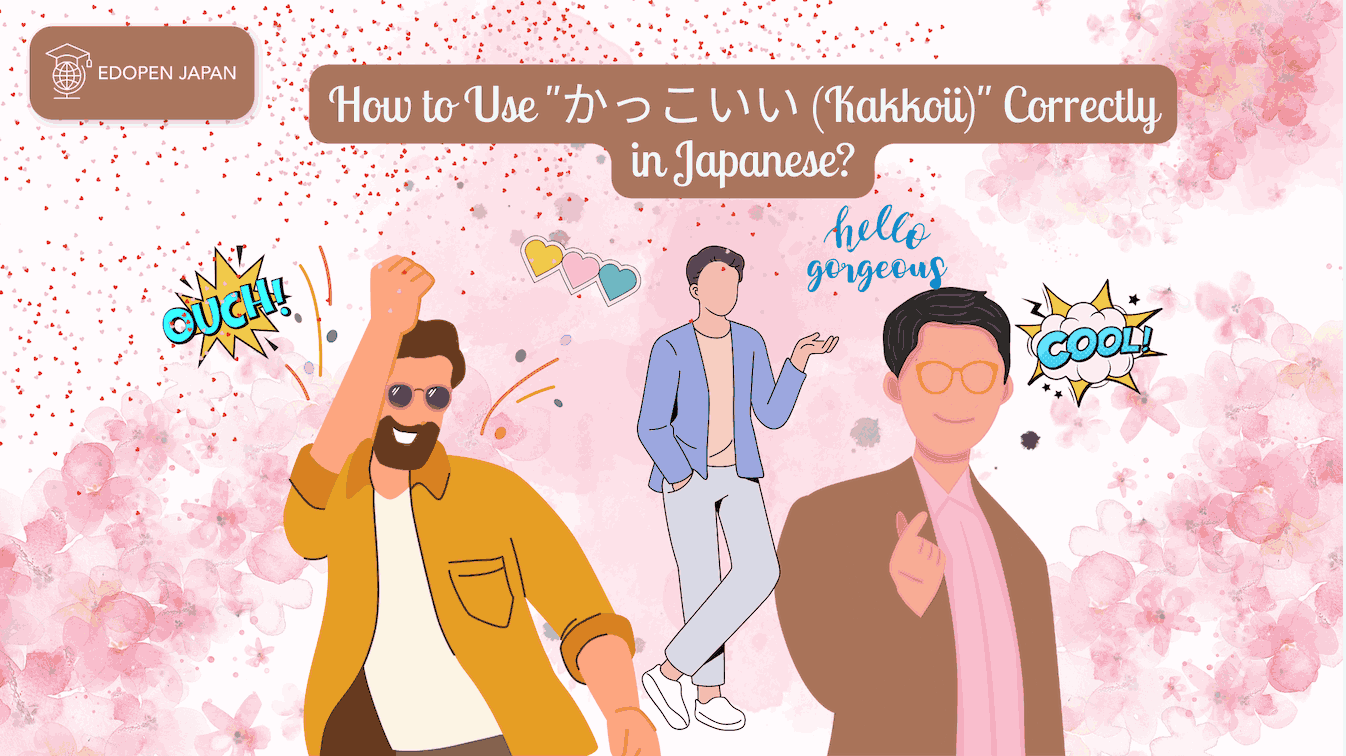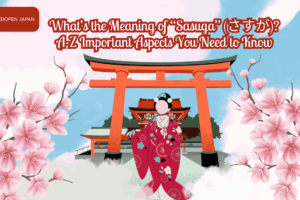“Kawaii かわいい”, “Oishii おいしい”, I think you already know these two Japanese expressions that are widely used to describe anything that is “cute” and “delicious”. What about “かっこいい (kakkoii)”? Have you ever heard this Japanese phrase used while walking down the street? Or during a conversation with a group of people?
We all can’t deny the importance of learning adjectives. Adjectives can help us express our feelings about almost anything. And the more adjectives we use, the more accurately we can describe them.
This article will show you the introduction to the phrase “kakkoii” and how to use “kakkoii” correctly. Also, in the last part, 3 conversations using “kakkoi” are provided for you to check how to use “kakkoii” correctly in everyday life.
In addition, to broaden your horizons in the use of other famous Japanese phrases, please also read our extensive discussion of phrases that are equally interesting, unique, and very common in everyday Japanese conversation, such as:
Read also:
What’s the Meaning of “Naruhodo (なるほど)”?
15 Great Ways to Say Thank You in Japanese
The Meaning of Yabai (やばい)
A Brief Overview of “かっこいい (Kakkoii)”

➼ Hiragana: かっこいい
➼ Katakana: カッコイイ
➼ Kanji: 格好いい
While the hiragana form “かっこいい” is the most commonly used, we can find “kakkoi” written in two other forms, katakana and kanji, as shown above. The katakana form often appears in contexts such as posters, magazines, comics, or social media such as Instagram.
“Kakkoi” can be used as an adjective to describe someone or something as handsome, cool, or good-looking. Besides, “kakkoi” can also be used as an individual slang to express one’s feelings! “かっこいい!』
You can also hear young people, and sometimes some adults, use the term カッケー “Kakke-“. This is the so-called 若者言葉 (waka mono kotoba), literally the word of young people. Young people make variations on the end of adjectives or make up new words. Before we dive into the definition of “kakkoii”, let’s check the pronunciation first!
Please pay attention to the pronunciation of “っ”, also known as “small tsu” or “silent tsu”, between か and こ. “っ” is derived from “つ (tsu)”, but we don’t have a sound for “っ”. When we have “small tsu” between words, we should make a pause.
Taking かっこ (kakko) as an example, we can consider each character as a syllable. In this case, かっこ is made up of three syllables, and we need to pause for one syllable between か and こ.
The etymology of the word “かっこいい (Kakkoii)”
Let’s break this adjective into two parts, “kakko” and “ii”, to see how this phrase is formed!
❶ かっこ “kakko”
This part is derived from the noun 格好 (かっこう, kakkou). The definition of this word is “appearance, figure, or form.
❷ いい “ii”
This is an adjective that generally means “good” in English. This is a very interesting word that can be used either by itself or attached to other words. When “ii” is attached to other words, there are two ways.
✎ いい (ii) + noun
- いい匂い
(ii nioi): a good smell - いい夢
(ii yume): a good dream - いいセンス
(ii sensu): a good sense of … - いい成績
(ii seiseki): a good score - いい考え
(ii kangae): a good idea
✎ noun + が (ga) / は (wa) + いい (ii)
Generally, “いい” means “good”. From the table below, we can see that both “ii” and “yoi” belong to the basic (dictionary) form. But when this word becomes the past tense or the negative form, we can only use “yoi”.
Why do we need to know the conjugation of “いい”? Because when we make a sentence, we may want to tell others that something “was” good or something “wasn’t” good.
| Basic Affirmative | Affirmative Formal | Negative Formal – 1 | Negative Formal – 2 | |
|---|---|---|---|---|
| Present Tense | いい / よい ii / yoi | いいです。 ii desu | よくないです。 yoku nai desu | よくありません。 yoku arimasen |
| Past Tense | よかった。 yokatta | よかったです。 yokatta desu | よくなかったです。 yoku nakatta desu | よくありませんでした。 yoku arimasen deshita |
With this sentence structure, we can make sentences like the following to say something is good.
| Japanese | Rōmaji | English |
|---|---|---|
| 今日の天気がいい。 | tenki ga ii | The weather is good today. |
| 彼は運がいい。 | kare wa un ga ii | He is lucky. |
| 彼は頭がいい。 | kare wa atama ga ii | He is smart. |
| 彼は記憶力がいい。 | kare wa kiokuryoku ga ii | He has a good memory. |
The sentences above are all in the present basic tense, try to change the sentence to the past tense or with the negative form!
格好がいい ⇢ ⇢ ⇢ ⇢ かっこいい
kakkou ga ii ⇢ ⇢ ⇢ ⇢ kakkoii
From this structure, we can also see that “kakkoii” is a colloquial form derived from 格好がいい “kakkou ga ii”.
What is the opposite of “kakkoii”?
As I have mentioned above, the negative form of いい can be よくない or よくありません.
Also, there is an antonym for いい, which is 悪い “warui”, which literally means “bad”.
Therefore, the opposite of “kakkoii” can be written in かっこ悪い “kakko warui”.
Generally speaking, the difference between “yokunai” and “warui” is that using “warui” to describe something or someone feels too direct. Therefore, using “yokunai”, which literally means “not good”, is less direct.
How to Use “かっこいい (Kakkoii)”?

Whether human, animal, or thing, female or male, this phrase can be used to describe a wide range of nouns. We divide those that can be described as “kakkoii” into 4 groups. Let’s take a look below!
☻ Handsome / Cool / Good-looking appearance or style of someone (human) or animals
| その俳優はかっこいい。 | sono haiyū wa kakkoii | That actor is good-looking. |
| その選手はとてもかっこいい。 | sono senshu wa totemo kakkoii | That athlete is very cool. |
| あなたの犬はかっこいいですね。 | Anata no inu wa kakkoii desu ne | Your dog is cool. |
| 彼の髪型はかっこいい。 | kare no kamigata wa kakkoii | His hairstyle is cool. |
☻ Cool / Attractive behavior, voice, spirit or attitude
| お父さんの働いてる姿はかっこいい。 | otōsan no hatarai teru sugata wa kakkoii | My father looks cool when he is working. |
| 彼の演奏がかっこいい。 | kare no ensō ga kakkoii | His musical performance is cool. |
| あの酒をつくる職人はかっこいい。 | ano sake o tsukuru shokunin wa kakkoii | The craftsman who brews sake is cool. |
| このバンドはめちゃくちゃかっこいい。 | kono bando wa mechakucha kakkoii | This band is extremely cool. |
☻ Cool Things (objects)
| あのかっこいいサングラスをかけているのは誰ですか? | ano kakkoii sangurasu o kakete iru no wa daredesu ka | Who is the person there wearing cool sunglasses? |
| かっこいい車 | kakkoii kuruma | a cool car |
Summary
In many case, people may use this slang a lot in different situations. Most of the time it’s when we want to run into a problem that we can’t solve. At that moment, someone passing by might would just give us a hand without hesitation and without saying a word.
Then, we would subconsciously say KAKKOII! What about you? What is the moment when you would say KAKKOII? Let’s take a look at the following points as well as a review:
- The opposite of “かっこいい (kakkoii)” is “kakko warui”.
- Kakkoii can be used to describe human, animal, object, attitude, spirit, voice, and behavior.
- English translation of “かっこいい (kakkoii)” can be handsome, cool, attractive, good-looking.













Leave a Reply